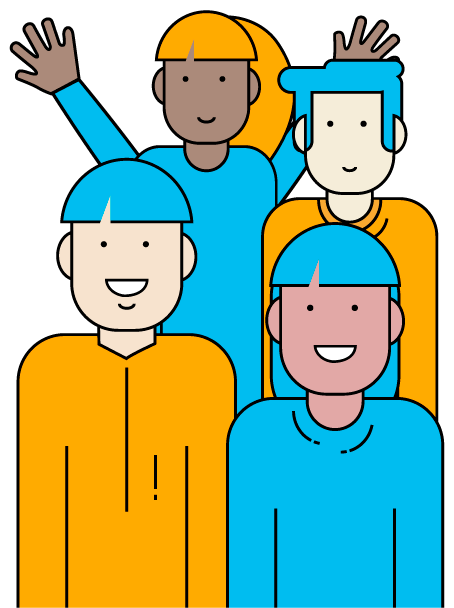Categories
Jutta Eckstein: 4 Secrets of Bossa Nova for Powerful, Motivated Teams
Jutta Eckstein: 4 Secrets of Bossa Nova for Powerful, Motivated Teams
with Jutta Eckstein


TRANSCRIPT
Richard: (00:13) Hi friends. Welcome back to With Great People, the podcast for high performance teams. I’m Richard Kasperowski. In this episode, I talk with Jutta Eckstein, an agile coach, consultant and trainer. Jutta is the author of many books including company-wide agility, retrospectives for organizational change, and agile software development with distributed teams, Jutta shares with us, her recipe for successful teams and reveals the secrets of the Bossa Nova approach to business agility. Yep. Bossa Nova. Do you want to know what that’s about? Take a listen. I hope you enjoy it. To support this podcast, visit my website, kasperowski.com thanks for listening.
Richard: (00:55) And today we have Jutta Eckstein with us on the podcast. Hi Jutta? How are you?
Jutta Eckstein: (01:03) Hi Richard. Yeah, I’m very good. Thank you.
Richard: (01:06) Awesome. Will you introduce yourself to our listeners?
Jutta Eckstein: (01:08) Yeah, sure. Well this can be quick or long. So I am in the actual field, I think, since ’97, ’98 that’s when I started with extreme programming. So I was a developer at the time and over time I moved on to more helping teams, so teams of teams and early in the 2000s I think, like 2001, 2002 I worked on scaling Agile and also published about that. So, in 2004 I published the very first book on scaling Agile and I moved on to distributing Agile because most of the large scale stuff was distributed at that time and then and also published about that. So I have a few books published and then I moved on and looked more into what kind of company do, so the organization to either support or how does it sometimes hinder really the benefit of agile development. And that was then a new focal area and then look for example. And how can retrospectives help organizational change or what about cost of delay, what can we do here, especially from the organization point of view. And my latest thing is what we call Bossa Nova, which is the synthesis of Beyond Budgeting, Open Space, Sociocracy and Agile and all for implementing business agility.
Richard: (02:36) That’s incredible. So Beyond Budgeting, Open Space, Sociocracy and Agile.
Jutta Eckstein: (02:41) Yes.
Richard: (02:42) This is awesome. I want to know more about all of this.
Jutta Eckstein: (02:45) Yeah. And this together is the synthesis that we now call Bossa Nova. The nice thing is actually that Bossa Nova as it’s known, so in the, in the real sense, not how we use it, it’s a fusion of samba and jazz. And in the same way we think it’s a fusion what we’ve created here, right? And then what we also see is [inaudible 00:03:06] as also a dance. And as a dancer you adjust, adapt or be in flow with the music and with the people on the dance floor. But you also influence what’s played and how the people on the dance floor act and that’s also what we think is happening there with our Bossa Nova. And then the third thing is that the little literal translation, so it’s properties and means new trend, new wave.
Richard: (03:32) Oh! So Bossa Nova is the new trend. It’s the new way of business agility. That’s so cool.
Jutta Eckstein: (03:37) Exactly, yeah.
Richard: (03:38) All right, well I have a feeling we’re going to talk more about this as we go.
Jutta Eckstein: (03:42) Okay, yeah. Cool.
Richard: (03:44) So this is the podcast about great teams. When you look back or maybe when you looking in the present, what’s the best team you’ve ever been part of in your entire life?
Jutta Eckstein: (03:56) So a team that I have in mind, I have worked with the [inaudible 00:04:00] XP team.
Richard: (04:00) Okay.
Jutta Eckstein: (04:02) And maybe this is already kind of one criteria or qualification also because, but I also know also from my, my background that very often XP teams, they started doing XP because they wanted to do it. But I see nowadays very often it’s that someone in the company demands the teams to do whatever scrum or something, right? So the thing is understanding by yourself how this can help you to improve and get better and deliver a great product versus somebody else believes that is the case.
Richard: (04:47) Right.
Jutta Eckstein: (04:47) I think this already makes a huge difference.
Richard: (04:50) Yeah, totally. And similarly for me, whenever I talk about the best teams of my life is the example, one of the examples that I use, I never, I never said it was an XP team, but it was this experience where a couple of us were writing code together and we, we bought the XP book and we were, we were doing those things.
Jutta Eckstein: (05:09) And technical practices were important, right?
Richard: (05:13) Yeah. Yeah. And they were the driver for the social practices and sometimes…
Jutta Eckstein: (05:17) Yes. Yeah. I agree.
Richard: (05:18) Cultural sense.
Jutta Eckstein: (05:19) Right? Yeah. Well, and then also the in April, really for delivery and when we talk about Agile, we talk about continuous delivery or at least frequent regular delivery. And if you don’t have the technical practices in place it’s damn hard.
Richard: (05:37) Right. And I, I love that you have this background as well. One of the sort of the joke I’ve been, I’ve been using this year is I want to put the software back into Agile software development.
Jutta Eckstein: (05:46) Yeah, I know what you mean.
Richard: (05:47) It’s the technical things that.
Jutta Eckstein: (05:49) Yes!
Richard: (05:50) Without the technical practices, it’s almost like nothing else matters because you have to deliver the products.
Jutta Eckstein: (05:56) Right.
Richard: (05:56) So this best team of your life, this XP team, and again, really cool to me because mine is also an XP team. If you could summarize everything about that team into one word, what would that one word be?
Jutta Eckstein: (06:12) I would say something like striving.
Richard: (06:16) Striving. That’s a great word. What do you mean by striving?
Jutta Eckstein: (06:20) Well, for delivery, for improving, for learning, for knowledge sharing. I don’t know. Learning together with the customer. All of these.
Richard: (06:30) And, and that team, that striving team, what are some of the ways that you know it was the best team. Is there anything objective, anything that people could measure or observe from the outside?
Jutta Eckstein: (06:40) Ah yeah, probably yes. And maybe no, because you might see it somewhere else as well and it’s not like that.
Richard: (06:47) Yeah.
Jutta Eckstein: (06:47) So, so again, so the one thing about the technical practices, you can measure them, you can see them and also the people had in how they could prove that they improve. For example, they had their statistics on how many tests they have now and how the test base is growing. So, not, not only like the regular thing of passing and failing ourselves, but how big is our test space all together and then celebrated when they hit another round number or, so when the, I remember when the first thousands were there then this was a big thing. You know, it’s kind of this maybe little things which are not really little, but they are really important. Yeah. And everyone was passionate about that.
Richard: (07:34) Okay. And there’s, there’s the tech practices, there’s joy, there’s the people that are passionate.
Jutta Eckstein: (07:39) Yeah.
Richard: (07:39) Anything else subjective? Like what did it feel like or what did other people feel like or…
Jutta Eckstein: (07:45) Well, like what you could also observe is that over time they, they’re always came these visitors so from inside the company because they sense that something else is going on there.
Richard: (08:00) Right.
Jutta Eckstein: (08:01) You know and they wanted to know “what is it? So I am going to take a look. What are you actually doing?” We’re programming, right?
Richard: (08:09) Yeah.
Jutta Eckstein: (08:09) But still that is the funny thing that I’m saying that, but still they had fun and that was a new concept.
Richard: (08:18) They were programming and they were having fun.
Jutta Eckstein: (08:21) Right, right. And then they, they started, I don’t know, for this team, coffee was a big thing.
Richard: (08:28) Okay.
Jutta Eckstein: (08:28) And so they bought a really super whatever, coffee machine, Italian thing, on eBay and fit it for it and when they got it, it was a big thing. And then they had their, well instead of the pomodories, when they did pair programming it was always a coffee break then in between and so everything like around that and I guess teams who are great, they have some kind of ritual, whatever it is. And some, I don’t know, maybe it’s like kind of a token even and of course you can argue coffee is not good for your health and so on. Yeah.
Richard: (09:12) Unless you’re Italian perhaps.
Jutta Eckstein: (09:14) Yes. Right.
Richard: (09:15) I have a friend who tells me he drinks eight cups of coffee a day and he’s like, but they’re little.
Jutta Eckstein: (09:20) Yeah, right. They’re little and very strong.
Richard: (09:24) So that’s really cool. Okay, so coffee and this idea of ritual that they would keep a coffee break timers, they were pair programming together. What else? So these are some of their practices. The things that they did. They were doing some extreme programming. They were doing some coffee, they had some ritual. What? What were some of the other things that went into this team’s greatness?
Jutta Eckstein: (09:47) Definitely also information radiators and having them, keeping them alive. Let’s put it this way. Keeping them alive. What it means that whenever people felt that, well, we really know that by now, then that information later just went to the bin. Right? We didn’t need it anymore. So, then something else took its place because that was the thing that we needed to discuss and remember and all of that.
Richard: (10:15) Okay.
Jutta Eckstein: (10:16) Because often when I see teams that are not so great, then I see a lot of outdated stuff…
Richard: (10:23) Yeah.
Jutta Eckstein: (10:23) …hanging around and it might look nice, but it’s not doing anything.
Richard: (10:29) Yeah. Like it becomes such an ingrained ritual that we’re afraid to take it off the wall.
Jutta Eckstein: (10:33) Yeah.
Richard: (10:33) What were some of the information radiators that they were using?
Jutta Eckstein: (10:36) It, so stuff that comes to my mind right now is really more technical stuff. So, pieces from the architecture, so kind of, oh, how we want to change something here and there. So yeah, really probably again, because it’s XP team, technical, more technical stuff, and technical.
Richard: (11:00) Yeah. Cool. Any other practices that this team had that you think went into their greatness?
Jutta Eckstein: (11:05) Always being on the lookout for what can be done to improve things. So for example, keeping eyes open if there is a new framework that would support whatever we are doing and speed things up. And that might sound weird, but never, never be really satisfied with the status. But always thinking, Oh, what else can we do and how can we even get, it’s still better.
Richard: (11:29) Yeah, right.
Jutta Eckstein: (11:30) And a little bit, I think it, it doesn’t sound so good because the thing of never being satisfied sounds also well maybe then you are hard at the burnout also, but that wasn’t true for hat team, it was more like, yes, we can do that and we can even do more of that.
Richard: (11:50) Yeah. I think that goes back to your word striving, right?
Jutta Eckstein: (11:53) Yeah. Yeah.
Richard: (11:55) So we’re always striving for, for always striving for better.
Jutta Eckstein: (11:58) Yeah.
Richard: (11:59) Now, what practices from this team or what in general, if you could give advice – and I know you actually do this, you do give advice to teams – What would you tell listeners to do to get the same kind of greatness in their own team?
Jutta Eckstein: (12:13) I guess if it’s the thing that … it’s not the team’s ideas to go and the Agile way, but they are asked to do then really very carefully on “why would this help us?” So stop with the “why and what would we gained from that?” And also looking at “what did we do before that might still help us?” So not throwing out everything because there’s probably stuff around that has been working for many years and we should keep it and again, maybe improving it and on the other hand, but what annoys us for a long, long time and we now can use that Agile process to overcome it and finally get rid of it and, and do it better.
Richard: (13:05) Alright.
Jutta Eckstein: (13:06) So probably it is keep retrospecting.
Richard: (13:12) Retrospecting, yeah.
Jutta Eckstein: (13:13) Yeah.
Richard: (13:13) Alright. And I want to go back to Bossa Nova and your eyes are lighting up.
Jutta Eckstein: (13:20) Yes.
Richard: (13:21) What else can you, what else can you tell us about Bossa Nova?
Jutta Eckstein: (13:23) Yeah, well the thing is, as I said, I kind of look more into organizations and at the moment it is that so many people talk about Agile organizations and that this is needed for various reasons. Well on the one hand it’s, I believe it starts also with digitalization that a software is really kind of the core part of almost every company. And although the company might not know it yet, but they, it’s taken. Yeah. So it’s very integral, right? So to quote [inaudible 00:13:55] here, and with that, people also know what’s done in software that makes it happen and therefore also what does it mean for us as a company? What do we need to change if digitalization is such a thing? And then all the Bucharest stuff, changing markets, disruptions and, and so on. So what I see is that more and more companies really tried to be Agile or claim to be or whatever. However, it’s not really clear what it means.
Richard: (14:26) Yeah.
Jutta Eckstein: (14:26) And actually what I really think it means, it is to think beyond Agile because Agile in itself doesn’t provide an answer to companies. It provides some answer but not like the entirety. There is not much about like what does it mean for the organizational structure, or for the strategy, or for everything around finance, or legal or whatever. Right? And there are some people who try to, we’ll just use agile and translate it and there’s the HR marketing manifesto or whatever. So there are different, these kinds of things. However, what I think is there is a lot of stuff out there already.
Jutta Eckstein: (15:08) There are people, communities who have looked at these different aspects of companies for a long time and they found answers to it. So one, one example is beyond budgeting where beyond budgeting, Gilly says, well if you fix your budget on an annual basis, you can never be Agile as a company in the literal sense, you cannot be adaptive, responsive, fast, nimble, all of that because the money is already in the different buckets. No matter how the market changes and you might need now to do something different than you thought at the beginning of the year. And so we were looking, some of my coworkers and I, we were looking at stuff that’s already there and they, it’s existing and it helps companies to be Agile from different perspectives and yeah.
Richard: (15:59) All right, cool. Anything else that you want to share with listeners?
Jutta Eckstein: (16:02) I guess the most important thing for being, well, sustaining Agile and be a great team or implement a great time or company is to stay open towards experimentation. And again, in Bossa Nova terms we call this “probing” because we think an experiment is just like a subset of it and for us the probe is we reflect on what is our current situation and then we come up with the hypothesis but we think might happen, or what’s needed and then come up with one or several experiments and also follow those experiments we at first measure if the situation is really the way it is and then became post measure after the experiment if our hypothesis was true or not, right? And then keep going with this. And those probes, they can be really small or sometimes they are bigger. But the important thing is to have that attitude of, well, it’s again the striving I guess. Right? So still continuously looking at what’s helping us to overcome whatever pain we are facing right now or challenge we are seeing right now.
Richard: (17:20) And if listeners want to get in touch with you, is there, is there a good way to do that?
Jutta Eckstein: (17:24) Yeah. Well, one way definitely is Twitter. That’s a Jutta Eckstein, so my full name is my Twitter handle, or LinkedIn would work as well. Yes.
Richard: (17:32) Alright, perfect.
Jutta Eckstein: (17:32) Yeah.
Richard: (17:36) Jutta, thank you so much for joining us today. I really appreciate it.
Jutta Eckstein: (17:38) Thank you for having me.
Speaker 1: (17:42)
Hi friends. Thanks for listening and remember to support this podcast, sign up for my newsletter at kasperowski.com





